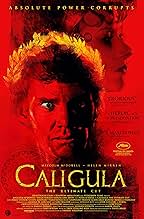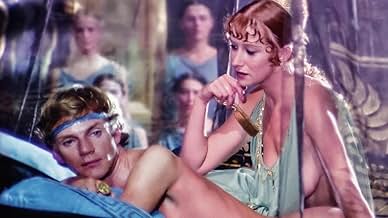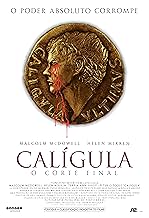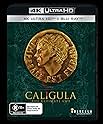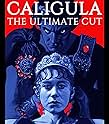CALIFICACIÓN DE IMDb
6.3/10
1.6 k
TU CALIFICACIÓN
Sigue a Calígula, mientras mata a su taimado abuelo adoptivo y toma el control del decadente Imperio Romano, sumiéndose en una espiral de depravación, devastación y locura.Sigue a Calígula, mientras mata a su taimado abuelo adoptivo y toma el control del decadente Imperio Romano, sumiéndose en una espiral de depravación, devastación y locura.Sigue a Calígula, mientras mata a su taimado abuelo adoptivo y toma el control del decadente Imperio Romano, sumiéndose en una espiral de depravación, devastación y locura.
- Dirección
- Guionista
- Elenco
Malcolm McDowell
- Caligula
- (material de archivo)
Helen Mirren
- Caesonia
- (material de archivo)
Teresa Ann Savoy
- Drusilla
- (material de archivo)
Peter O'Toole
- Tiberius
- (material de archivo)
John Gielgud
- Nerva
- (material de archivo)
Guido Mannari
- Macro
- (material de archivo)
Giancarlo Badessi
- Claudius
- (material de archivo)
Bruno Brive
- Gemellus
- (material de archivo)
Adriana Asti
- Ennia
- (material de archivo)
Leopoldo Trieste
- Charicles
- (material de archivo)
Paolo Bonacelli
- Chaerea
- (material de archivo)
John Steiner
- Longinus
- (material de archivo)
Mirella D'Angelo
- Livia
- (material de archivo)
Donato Placido
- Proculus
- (material de archivo)
Osiride Pevarello
- Giant
- (material de archivo)
John Francis Lane
- Major Domo
- (material de archivo)
Eduardo Bergara Leumann
- Bergarius
- (material de archivo)
Andrew Lord Miller
- Senator Acesius
- (material de archivo)
- Dirección
- Guionista
- Todo el elenco y el equipo
- Producción, taquilla y más en IMDbPro
Opiniones destacadas
Now I'll be honest, I think John Hurt ("I Claudius" - BBC - 1976) made a better Caligula, but Malcolm McDowell is still pretty convincing as the despotic sexual deviant who held the ultimate power in the Roman Empire for four years. It ought not to have been a surprise that he turned out the way he did when we are introduced to the decrepitly monstrous Tiberius (Peter O'Toole) on his island paradise of Capri. He lives there in a court of acolyte nymphs and "fishes" guided only by the vaguest semblance of decency from his friend Nerva (Sir John Gielgud). When that brief sequence of hedonism is swiftly over, our antihero assumes the throne and proceeds to share it with his sister Drusilla (Teresa Ann Savoy) with whom he enjoys a pretty incestuous relationship. There's pressure on him to marry, though, and father a legitimate child - so along comes Caesonia (Helen Mirren) - a woman all too keen to father the imperial progeny whilst enjoying a life of luxury and depravity. That's the history bit - which is really all rather peripheral to this shockingly scripted exercise in soft-porn which we are now going to watch in all it's three hour glory. It's clear that no expense has been spared on the look of the film, and to be fair to director Tinto Brass he does offer us quite a convincing glimpse at the excessiveness of a despotic court ruled by a monarch who believed himself a god - and who had few prepared to argue. It's maybe on that last point that "Longinus" (John Steiner) takes a decisive stance. He is the chancellor who increasingly finds himself, along with Praetorian Commander Chaerea (Paolo Bonacelli), more and more disgusted by the antics of this man with the thinnest grasp on reality. There's nudity all over the shop to the point that it becomes innocuous and once you've got used to that the rest of it fails to carry what could have been a blank cheque opportunity to portray the pivot of historical decadence. Instead, we have McDowell hamming it up energetically as he flounces around, scantily clad, but very little else. It's tawdry, no other word for it - and the unwelcome intermission completely throttled whatever pace there was as it sort of lumbered along in the most clunky of episodic fashions to an denouement that history told us about nearly two thousand years ago. It doesn't seem to know whether it's a movie or a sequence of short theatrical plays, Mirren adds precisely nothing and the magnificently odious O'Toole isn't around long enough to make enough of a difference. It's a shambles, certainly, and this ultimate cut is far, far too long - but somehow it's not unwatchable. You might never eat cottage cheese again!
This is a superb work of film forensics, creating a version of the film with the narrative cohesion that the original release sorely lacked. Cutting all the gratuitous porn plays a major part in giving the film that narrative cohesion and allows Gore Vidal's political themes to take centrestage. The performances truly shine, with original actors' vocal performances restored instead of the over-dubs used for some characters- especially good for Teresa Ann Savoy. Helen Mirren is given considerably more screentime, which is very welcome, and Malcolm McDowell's performance is revealed as the Oscar-worthy performance we deserved to see in 1980. The new music is also a huge improvement on the 'found' score of 1980.
However there are three exclusions that I didn't like. One was the death of Proculus, which gave some closure to the unforgettable marriage violation scene - and is an extraordinary scene in itself. I think it could have remained without the gratuitous bit with the naked ladies. The second was the scene with Ennia on the bed being 'serviced' by her male companions- it was not entirely clear what service they were providing! A re-edit could make this clearer without becoming porn. The most seriously disappointing ommission for me though was the conclusion of John Gielgud's performance - when Nerva and Caligula share a powerful moment. Given this edit's aim of enhancing the performances, it seems very strange to rob Gielgud of any screetime, given how brief his role is. Perhaps the restorers thought this moment made Caligula look too mad too early but I think it's a vital moment for both characters, and is reflected later in the aforementioned, also cut, Proculus scene. For an 'ultimate' cut I think this scene needs to go back.
In any case I think this is an amazing feat of restoration bringing this extraordinary film much closer to the one Tinto Brass and Gore Vidal intended it to be.
However there are three exclusions that I didn't like. One was the death of Proculus, which gave some closure to the unforgettable marriage violation scene - and is an extraordinary scene in itself. I think it could have remained without the gratuitous bit with the naked ladies. The second was the scene with Ennia on the bed being 'serviced' by her male companions- it was not entirely clear what service they were providing! A re-edit could make this clearer without becoming porn. The most seriously disappointing ommission for me though was the conclusion of John Gielgud's performance - when Nerva and Caligula share a powerful moment. Given this edit's aim of enhancing the performances, it seems very strange to rob Gielgud of any screetime, given how brief his role is. Perhaps the restorers thought this moment made Caligula look too mad too early but I think it's a vital moment for both characters, and is reflected later in the aforementioned, also cut, Proculus scene. For an 'ultimate' cut I think this scene needs to go back.
In any case I think this is an amazing feat of restoration bringing this extraordinary film much closer to the one Tinto Brass and Gore Vidal intended it to be.
Caligula is a film with a storied history. What began as a sprawling historical epic saw much of the film land on the cutting room floor. In its place, a violent and pornographic cash-grab that bore little resemblance to the script by Gore Vidal. Though a box office success, thanks to the controversy surrounding the film, critics derided it, and the cast disowned it. Now, forty-four years later, Caligula: The Ultimate Cut intends to showcase the film's original vision-a riveting and complex historical drama showcasing the intoxicating allure of sexuality and power. The film runs nearly three hours, is entirely fascinating, and delivers a triumphant expose on how 'absolute power corrupts absolutely.' In an era of director's cuts and alternate versions, Caligula is a magnificent restoration with a triumphant zeal.
Full Review: Geek Vibes Nation.
Full Review: Geek Vibes Nation.
Let me start by saying that I had recently watched the original for the first time, ending up being shocked how bad it is, as majority of people. It was pointless, too porny, to vague.
However, this one here, shows how much editing is important, especially soundtrack and music in the film. The ambient is there, the plot is there, the arcs of the characters is there. All that while still having a unique and strong artistic form to it. I really enjoyed this movie, and can't point my finger why. However it was 3h of pure captivation and mind stimulation. I really do hope this becomes a trend and re-edits of famous disasters get a new life.
However, this one here, shows how much editing is important, especially soundtrack and music in the film. The ambient is there, the plot is there, the arcs of the characters is there. All that while still having a unique and strong artistic form to it. I really enjoyed this movie, and can't point my finger why. However it was 3h of pure captivation and mind stimulation. I really do hope this becomes a trend and re-edits of famous disasters get a new life.
This is truly a lost opportunity. After a massive search, a film scholar tracked down all of the original film shot by director Tinto Brass, who is still alive, and he wante4d to work with Brass to finally make a director's cut.
Penthouse, which own the rights, changed management and the new management instead turned the footage over to some people with absolutely no background in film restoration. This new team said they wanted to restore the film to the intentions of Gore Vidal's script. The main problem with that is Tinto Brass was not filming Vidal's script as it was written, as he thought it was terrible. He and actor Malcolm McDowell reworked the script into something more of an art film.
The result of this restoration is that the scenes are finally in the right order but put together with with no sense of style or pacing. Tinto Brass envisioned lots of close up and fast editing, and completed about half of the film this way. Instead we get long takes that emphasize the lavish sets and obscure the action. It looks like a rough cut that is waiting for someone to add closeups and quicken the pace. A few individual scenes work much better in the original due to better editing.
Another drawback is the overly modern score, which doesn't reflect musical trends of the 1970s, when the film was shot.
On the plus side, all of the incongruous hardcore scenes shot by Penthouse chief Bob Guccione are gone. A more coherent performance by Malcolm McDowell can be seen, though at times some of the more manic takes might have worked better to emphasize his deteriorating mental state.
Penthouse, which own the rights, changed management and the new management instead turned the footage over to some people with absolutely no background in film restoration. This new team said they wanted to restore the film to the intentions of Gore Vidal's script. The main problem with that is Tinto Brass was not filming Vidal's script as it was written, as he thought it was terrible. He and actor Malcolm McDowell reworked the script into something more of an art film.
The result of this restoration is that the scenes are finally in the right order but put together with with no sense of style or pacing. Tinto Brass envisioned lots of close up and fast editing, and completed about half of the film this way. Instead we get long takes that emphasize the lavish sets and obscure the action. It looks like a rough cut that is waiting for someone to add closeups and quicken the pace. A few individual scenes work much better in the original due to better editing.
Another drawback is the overly modern score, which doesn't reflect musical trends of the 1970s, when the film was shot.
On the plus side, all of the incongruous hardcore scenes shot by Penthouse chief Bob Guccione are gone. A more coherent performance by Malcolm McDowell can be seen, though at times some of the more manic takes might have worked better to emphasize his deteriorating mental state.
¿Sabías que…?
- TriviaThe film is a complete re-imagination of Calígula (1979), based on 96 hours of never-before-seen footage recovered many years after its release. Under the supervision of historian Thomas Negovan, an "Ultimate Cut" of the film was created. Instead of expanding existing scenes with the new footage, the entire film was edited from scratch, which resulted in a version that doesn't contain a single frame from the theatrical version. Visual effects were used to enhance scenes and replace cheap sets and backgrounds, and AI technology was used to restore previously unusable dialogue that was plagued with background noises. A new music score was composed as well, in contrast to the public domain ballet music. A limited theatrical release was planned in late 2020, but it was delayed due to legal difficulties, distribution issues and the Covid-19 pandemic. This version eventually premiered at the Cannes Film Festival in 2023, with high remarks by actors Malcolm McDowell (who previously had been ashamed by the film) and Dame Helen Mirren.
- ConexionesEdited from Calígula (1979)
Selecciones populares
Inicia sesión para calificar y agrega a la lista de videos para obtener recomendaciones personalizadas
Detalles
Taquilla
- Total en EE. UU. y Canadá
- USD 76,031
- Fin de semana de estreno en EE. UU. y Canadá
- USD 30,815
- 18 ago 2024
- Total a nivel mundial
- USD 91,202
Contribuir a esta página
Sugiere una edición o agrega el contenido que falta

Principales brechas de datos
What is the Canadian French language plot outline for Caligula (2023)?
Responda

